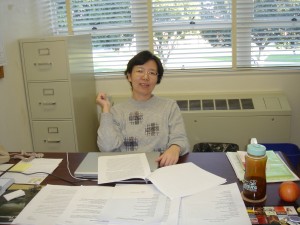Guotong Li
Guotong Li, Ph. D.
Title
Professor
Credentials
B.A., Peking University, China (Chinese History)
M.A. National University of Singapore (Chinese History)
Ph.D., University of California, Davis (Chinese History)
Contact Information
(562) 985-4465
Office: FO2-206
California State University, Long Beach
1250 Bellflower Blvd., MS 1601
Long Beach, CA 90840-1601
Research Interests
Dr. Li’s current research interests focus on gender and family in maritime Asia during the encounters between the Muslim diaspora and Chinese merchants before European hegemony. She has published two monographs, entitled Migrating Fujianese: Ethnic, Family, and Gender Identities in an Early Modern Maritime World (Brill, 2016) and In Quest of Immortality: Women’s Education in Late Imperial China, 1368-1911 (Guangxi Normal University Press, 2014) respectively. She is completing her new book project on a Chinese Muslim community in late imperial Quanzhou, the world’s largest seaport under the Mongol empire. This project was sponsored by a Luce/ACLS fellowship (2015-2016), aiming to bring a more global perspective on local histories and to enrich global maritime history with the human agency of gender and ethnicity.
Research Grants
- CSULB Faculty Sabbatical Award, 2020-2021.
- Henry Luce Foundation/American Council of Learned Societies Program in China Studies Postdoctoral Fellowship, 2015-2016.
- CSULB Faculty Sabbatical Award, 2013-2014.
- CSU Wang Family Faculty Stipend Fellowship, 2010-2011.
- The University of California “Pacific Rim Research Grant” (Dissertation Award), 2005-2006.
- Research Scholarship from the National University of Singapore, 1999-2001.
- Chinese Academy of Social Sciences Junior Fellow Research Grant, 1997-1999.
Selected Publications:
Books:
Gender and the Family in Late Imperial China: Selected Works of Susan Mann. Shanghai: Fudan University Press, 2021. Co-edited with Weijing Lu, etc. (in Chinese).
Migrating Fujianese: Ethnic, Family, and Gender Identities in an Early Modern Maritime World. Leiden: Brill, 2016.
In Quest of Immortality: Women’s Education in Late Imperial China, 1368-1911. Guilin: Guangxi Normal University Press, 2014 (in Chinese, reviewed and interviewed by major media, including Nan Nü: Men, Women, and Gender in Early and Imperial China 18.1)
Biographical Dictionary of Chinese Women, Tang through Ming 618-1644. New York: M.E. Sharp, 2014 (co-eds with Lily Xia0 Hong Lee, Sue Wiles, etc.)
Hu Shi Zhuanji zuopin quan bian (The collected biographic works of Hu Shih). Shanghai: Orient Publishing Center, 1999, 4 volumes (in Chinese, co-eds with Geng Yunzhi).
Journal Articles and Book Chapters:
“Women’s Voices from ‘Our Homeland’: Fujian Women’s Local Identity and Identity Politics.” Journal of the Oriental Society of Australia 49 (2018): 186-210.
“Changing Identities: Chinese Muslims’ Marriage Strategies in Late Ming Quanzhou.” Ming Studies 76 (2017): 32-52.
“Local Histories in Global Perspective: A Local Elite Fellowship in the Port City of Quanzhou in Seventeenth-Century China.” Frontiers of History in China 11.3 (2016): 376-399.
“Transforming Islamic Customs with Confucian Rituals: Flexible Identities of the Muslim Ding Family in Late Ming Quanzhou.” Journal of Ming Studies 26 (2016): 127-164.
“The Control of Female Energies: Gender and Ethnicity on China’s Southeast Coast.” In Gender and Chinese History: Transformative Encounters, edited by Beverly Bossler. Seattle: University of Washington Press, 2015: 41-57.
“Rethinking Liang Qichao’s (1873-1929) Colonial Thinking.” In New Perspective on Chinese Intellectual History, edited by the National Institute for Advanced Humanistic Studies, Fudan University. Beijing: Zhonghua shuju, 2013: 58-68 (in Chinese, refereed).
“Fujian Coast: The Home of Boundary-crossers in the Eighteenth Century.” In Ming Qing Studies (2013): 259-274.
“New Migration History through a Gender Lens.” In A New Look at Chinese History through the Lens of Gender, edited by Clara Ho. Beijing: Social Sciences Academic Press, 2012: 174-177 (in Chinese, refereed).
“Imagining History and the State: Fujian Guixiu (Genteel Ladies) on the Road and at Home.” In The Inner Quarters and Beyond: Women Writers from Ming through Qing, edited by Grace Fong and Ellen Widmer. Leiden: Brill, 2010: 315-338 (translated into Chinese for publication by Peking University Press, 2013).
“Rethinking Women in Chinese Enlightenment during the 1898 Reform Era.” In Jianghai Journal (Nanjing: Jiangsu Academy of Social Science) 6 (2008): 19-25 (in Chinese, refereed). Reprinted in full in Women’s Studies (Information Center for Social Sciences, Renmin University of China) 1 (2009): 35-41.
“The Consciousness of Responsibility and ‘Immortality’ in Women’s Writings in Late Imperial China.” In Yenching Journal of Chinese Studies (Beijing: Peking University Press) 20 (2006): 55-77 (in Chinese, refereed).
“In Quest of Immortality: A Perspective of Chinese Women’s History.” In Bulletin of Ming-Qing Studies (Hong Kong: Hong Kong University) vol. 8 (2005): 203-220 (refereed).
“The Origins of Feminist Thinking in the Ming and Qing Dynasties.” Research on Women in Modern Chinese History (Taipei: Institute of Modern History, Academia Sinica) 3 (1995): 143-161 (in Chinese, refereed).
Courses
Methodology of History (HIST 301)
Imperial China (HIST 382A)
Modern China (HIST 382B)
The Environmental Evolution of Asia (HIST 390 in preparation)
Women, Gender, and Sexuality in Asia (HIST 406A)
Migration and Ethnicity in Modern China (HIST 412)
The Pacific Ocean in World History (HIST 444/544)
Senior Seminar: Gender and the Family in East Asia (HIST 499)
Senior Seminar: Population Movement and Ethnic Encounter in the Pacific World (HIST 499)
Senior Seminar: Material Culture and Daily Life in the Early Modern World (HIST 499)
Graduate Seminar: Comparative History: Cross-Cultural Women’s and Gender History (HIST 590)
Graduate Seminar: Selected Topic in Asian History (HIST 682)

